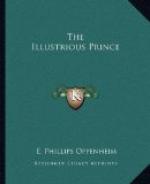“It is of no consequence, Soto,” he said,—“no consequence whatever.”
CHAPTER XIV. AN ENGAGEMENT
“Your rooms, Prince, are wonderful,” Penelope said to him. “I knew that you were a man of taste, but I did not know that you were also a millionaire.”
He laughed softly.
“In my country,” he answered, “there are no millionaires. The money which we have, however, we spend, perhaps a little differently. But, indeed, none of my treasures here have cost me anything. They have come to me through more generations than I should care to reckon up. The bronze idol, for instance, upon my writing case is four hundred years old, to my certain knowledge, and my tapestries were woven when in this country your walls went bare.”
“What I admire more than anything,” the Duchess declared, “is your beautiful violet tone.”
“I am glad,” he answered, “that you like my coloring. Some people have thought it sombre. To me dark colors indoors are restful.”
“Everything about the whole place is restful,” Penelope said,—“your servants with their quaint dresses and slippered feet, your thick carpets, the smell of those strange burning leaves, and, forgive me if I say so, your closed windows. I suppose in time I should have a headache. For a little while it is delicious.”
The Prince sighed.
“Fresh air is good,” he said, “but the air that comes from your streets does not seem to me to be fresh, nor do I like the roar of your great city always in my ears. Here I cut myself off, and I feel that I can think. Duchess, you must try those preserved fruits. They come to me from my own land. I think that the secret of preserving them is not known here. You see, they are packed with rose leaves and lemon plant. There is a golden fig, Miss Penelope,—the fruit of great knowledge, the magical fruit, too, they say. Eat that and close your eyes and you can look back and tell us all the wonders of the past. That is to say,” he added with a faint smile, “if the magic works.”
“But the magic never does work,” she protested with a little sigh, “and I am not in the least interested in the past. Tell me something about the future?”
“Surely that is easier,” he answered. “Over the past we have lost our control,—what has been must remain to the end of time. The future is ours to do what we will with.”
“That sounds so reasonable,” the Duchess declared, “and it is so absolutely false. No one can do what they will with the future. It is the future which does what it will with us.”
The Prince smiled tolerantly.
“It depends a good deal, does it not,” he said, “upon ourselves? Miss Penelope is the daughter of a country which is still young, which has all its future before it, and which, has proclaimed to the world its fixed intention of controlling its own destinies. She, at any rate, should have imbibed the national spirit. You are looking at my curtains,” he added, turning to Penelope. “Let me show you the figures upon them, and I will tell you the allegory.”




